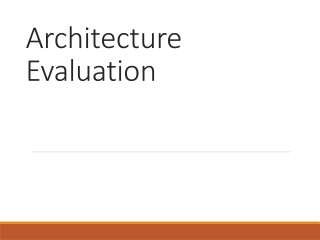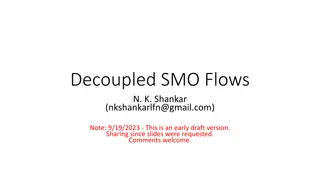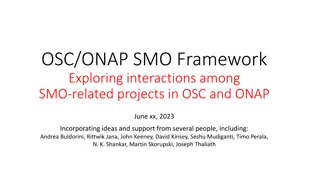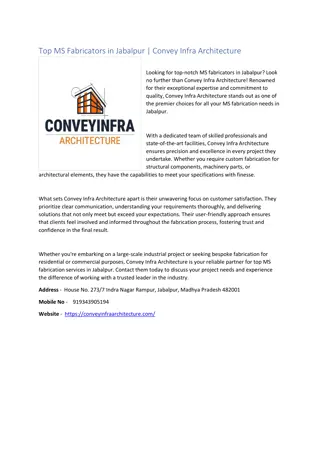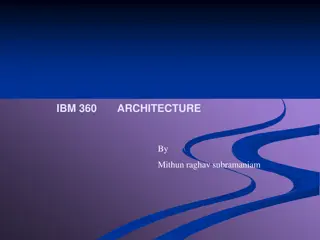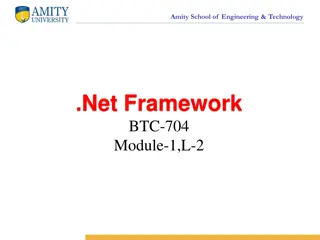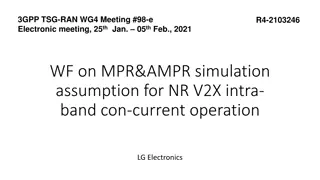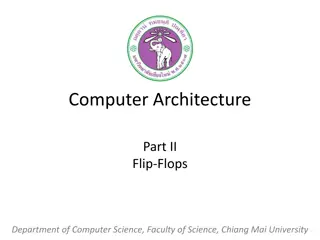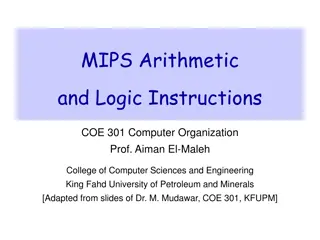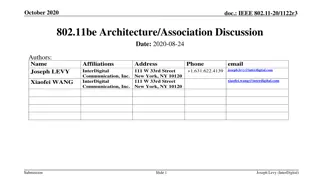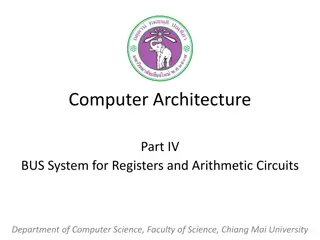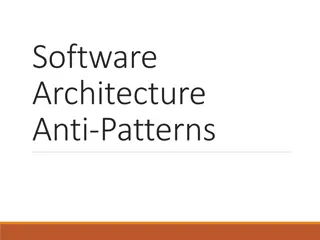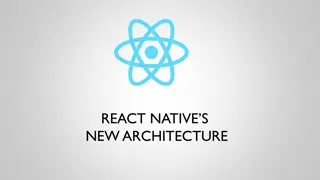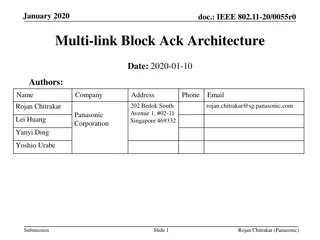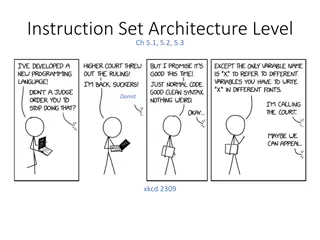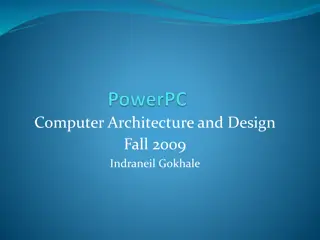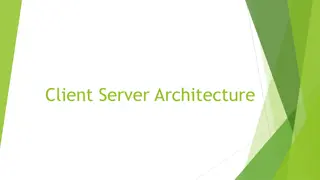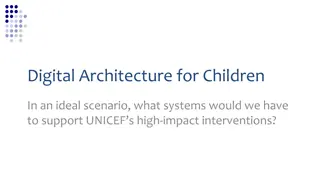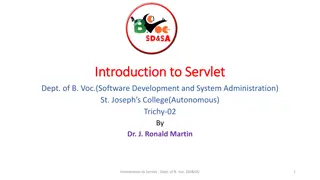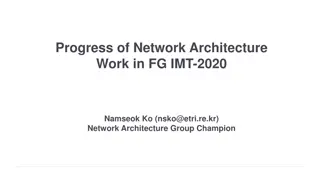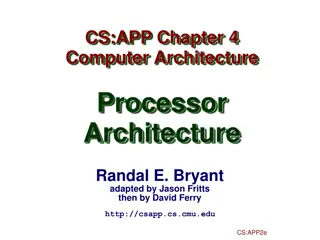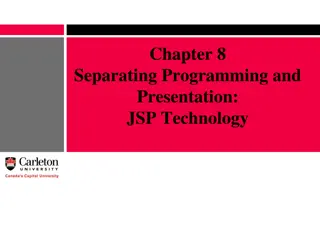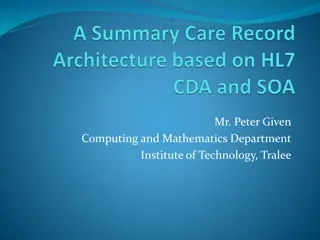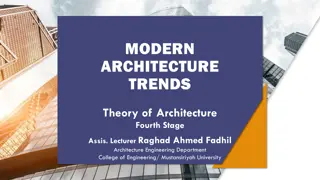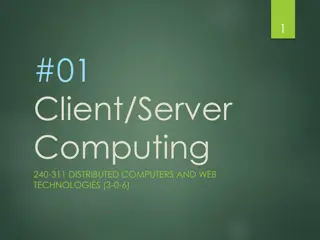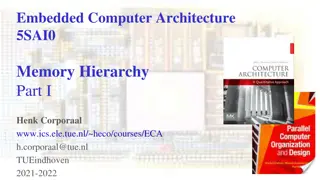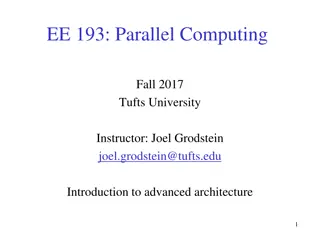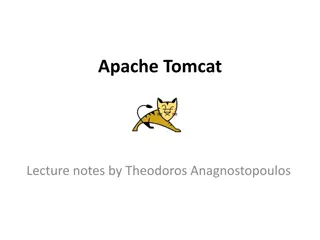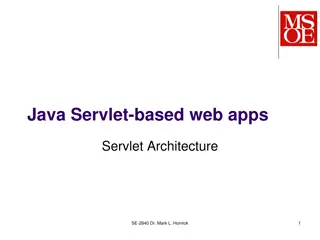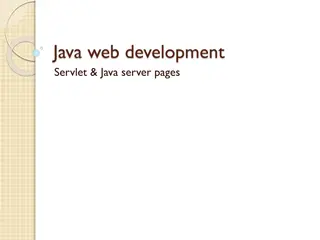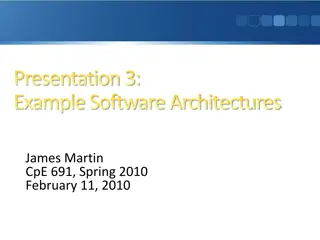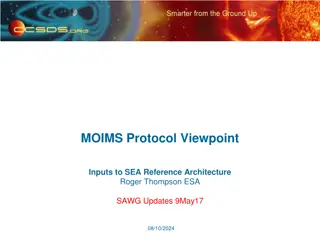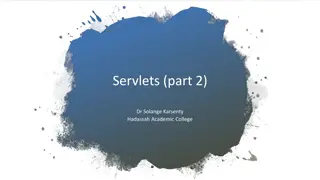❤Book⚡[PDF]✔ The Apollo Guidance Computer: Architecture and Operation (Springer
\"COPY LINK HERE ; https:\/\/getpdf.readbooks.link\/1441908765\n\nDownload Book [PDF] The Apollo Guidance Computer: Architecture and Operation (Springer Praxis Books) | The Apollo Guidance Computer: Architecture and Operation (Springer Praxis Books)\n\"\n
2 views • 6 slides
Architecture Evaluation
Exploring various aspects of software architecture evaluation, including tradeoff analysis methods, factors affecting architecture quality, and the importance of evaluating design decisions early in the software development life cycle to avoid costly changes later on.
3 views • 26 slides
Understanding Computer Organization and Architecture
A computer system is a programmable digital electronics device that processes data as per program instructions to provide meaningful output. It comprises hardware and software components, with hardware being the physical parts and software essential for driving the hardware. Computer organization fo
14 views • 71 slides
Decoupled SMO Architecture Overview
Develop flows showing interaction between SMO modules in the context of open-source architecture using OSC, ONAP, and other code. The objective is to align open-source work with O-RAN trends, improve synergy, reduce duplication, and provide feedback to O-RAN discussions. Related work includes Decoup
3 views • 27 slides
Exploring Interactions Among SMO-related Projects in OSC and ONAP
Coverage of SMO functionality is increasing in OSC projects with strong overlap between OSC and ONAP for SMO-related functionality. Consensus at TOC/TSC level in OSC and ONAP to align with trends in SMO-related discussions in O-RAN Alliance, especially WG1 SMO Decoupled Architecture TR. Efforts to a
5 views • 32 slides
Top MS Fabricators in Jabalpur | Convey Infra Architecture
Convey Infra Architecture, led by Alok Tiwari, stands out as one of the top MS fabricators in Jabalpur. With a commitment to precision and quality, their expertise in metal fabrication is unmatched. From intricate designs to large-scale projects, they ensure seamless execution and durable results. A
4 views • 1 slides
Evolution of IBM System/360 Architecture and Instruction Set Architectures
The IBM System/360 (S/360) mainframe computer system family, introduced in 1964, revolutionized computing by offering forward and backward compatibility, a unified instruction set architecture (ISA), and a balance between scientific and business efficiency. The critical elements of this architecture
0 views • 18 slides
Overview of .NET Framework and CLR Architecture at Amity School of Engineering
Explore the .NET Framework and Common Language Runtime (CLR) architecture at Amity School of Engineering & Technology, covering topics such as .NET components, technical architecture, common language runtime, CLR execution model, and more. Discover the support for multiple languages and the .NET lan
0 views • 28 slides
Overview of RF Architecture and Waveform Assumptions for NR V2X Intra-Band Operation
In the electronic meeting of 3GPP TSG-RAN-WG4, discussions were held on the RF architecture and waveform assumptions for NR V2X intra-band operation in band n79. Various options and recommendations were presented regarding RF architecture, antenna architecture, and waveform definitions for efficient
1 views • 7 slides
Understanding Combinational Circuits in Computer Architecture
Combinational circuits in computer architecture play a crucial role in transforming binary information from input data to output data. These circuits consist of logic gates connected in a specific arrangement to process binary data efficiently. Key components such as half-adders and full-adders are
1 views • 48 slides
Overview of Policy Service Node (PSN) Architecture
The Policy Service Node (PSN) architecture consists of various key components such as Policy Administration Node (PAN), Monitoring Node (MnT), Inline Posture Node (IPN), and Multi-Function Node. These components work together to enable efficient policy management and network monitoring within a netw
1 views • 5 slides
Understanding Computer Architecture and Organization
Computer architecture and organization are fundamental aspects of computing systems. Computer architecture focuses on the functional design and implementation of various computer parts, while computer organization deals with how operational attributes come together to realize the architectural speci
3 views • 40 slides
Overview of MIPS Arithmetic and Logic Instructions in COE 301
MIPS Architecture consists of R-Type and I-Type instruction formats for arithmetic, logical, shift, and immediate constant operations. It includes a variety of general-purpose registers and specific units for execution, floating-point operations, and memory handling. The presentation outlines the st
2 views • 29 slides
Overview of RESTful Web Services and Service-Oriented Architecture
This content provides insights into RESTful Web Services, Service-Oriented Architecture (SOA), Traditional Web Services, Overcomplication in system design, and Resource-Oriented Architecture. It discusses key concepts, technologies, and standards involved in these architectures, along with details o
2 views • 18 slides
Discussion on IEEE 802.11be MLD Architecture Alignment
IEEE 802.11 TGbe is exploring MLDs within the 802 architecture, focusing on aligning MLD operations with existing 802.11 features for enhanced compatibility. The MLD architecture aims to facilitate the flow of data between MAC SAPs and PHY SAPs, extending the current framework for APs and non-AP STA
1 views • 23 slides
Understanding BUS Systems in Computer Architecture
This article explores the concept of BUS systems in computer architecture, focusing on the efficient transfer of information between registers using a common bus structure. It delves into the implementation of bus systems for multiple-register configurations, such as a bus system for four registers
0 views • 24 slides
Common Software Architecture Anti-Patterns
Anti-patterns in software architecture are commonly occurring solutions to problems that lead to negative consequences. These arise due to insufficient knowledge or experience, misuse of design patterns, and lack of attention to evolving project architecture. Examples include Jumble, Stovepipe, Spag
1 views • 7 slides
Understanding React Native's New Architecture
React Native has introduced a new architecture that eliminates the traditional Bridge and leverages JavaScript Interface (JSI) for better communication between JavaScript and C++. This new architecture improves performance, enables synchronous execution, and enhances concurrency in React Native apps
1 views • 18 slides
IEEE 802.11-20/0055r0 Multi-link Block Ack Architecture Overview
This document from January 2020 presents an overview of the IEEE 802.11-20/0055r0 Multi-link Block Ack architecture proposed by Rojan Chitrakar from Panasonic. It discusses the negotiation of block ack agreements between multiple MLDs, common sequence number assignment, transmit and receive buffers,
1 views • 11 slides
Understanding Instruction Set Architecture and Data Types in Computer Systems
In computer architecture, the Instruction Set Architecture (ISA) level is crucial in defining how a processor executes instructions. This includes the formal defining documents, memory models, registers, and various data types that can be supported. The ISA level specifies the capabilities of a proc
2 views • 13 slides
PowerPC Architecture Overview and Evolution
PowerPC is a RISC instruction set architecture developed by IBM in collaboration with Apple and Motorola in the early 1990s. It is based on IBM's POWER architecture, offering both 32-bit and 64-bit processors popular in embedded systems. The architecture emphasizes a reduced set of pipelined instruc
2 views • 13 slides
Understanding Client-Server Architecture
Client-server architecture is a computing model where a central server hosts and manages resources and services for client computers over a network. There are different types of clients and servers, each with unique characteristics and roles. This architecture offers various advantages and disadvant
3 views • 15 slides
Digital Architecture for Supporting UNICEF's High-Impact Interventions
In an ideal scenario, the digital architecture for children would encompass systems such as Enterprise Architecture, Functional Architecture, and Solution Architecture to support UNICEF's high-impact interventions. It would involve integrated platforms for Health Information Exchange, Supply Chain M
0 views • 19 slides
Understanding the Life Cycle of Servlet in Java Web Applications
Servlets are essential components in Java web development, running inside the JVM on web servers to handle dynamic web applications. This introduction covers the loading, instantiation, initialization, service handling, and destruction processes of servlets, illustrating a typical life cycle scenari
0 views • 9 slides
Progress of Network Architecture Work in FG IMT-2020
In the Network Architecture Group led by Namseok Ko, significant progress has been made in defining the IMT-2020 architecture. The work has involved gap analysis, draft recommendations, and setting framework and requirements. Phase 1 focused on identifying 19 architectural gaps, such as demands for
1 views • 11 slides
Proposed Way Forward for Service-Oriented Architecture (SOA) in Space Missions
Proposed establishment of a Working Group by the CESG to develop a Service-Oriented Architecture (SOA) framework for space mission operations within the CCSDS. The focus includes identifying services, use cases, architecture definitions, and business cases to enhance CCSDS-wide interoperability and
0 views • 7 slides
Introduction to Y86 Instruction Set Architecture
Y86 Instruction Set Architecture is a simplified pseudo-language based on x86 (IA-32) architecture. It involves implementing the Fetch-Decode-Execute cycle, where instructions are fetched from memory, decoded, and executed. The Y86 ISA offers a simpler set of instructions and formats compared to x86
0 views • 25 slides
Exploring JSP Technology for Cleaner Programming and Presentation Separation
JSP technology allows for a clean separation of programming logic from presentation, enabling collaboration between developers and designers. By embedding Java code within HTML, JSP facilitates a more efficient and organized web development process. This article delves into the benefits of using JSP
0 views • 88 slides
Enhancing Healthcare Data Sharing with Service-Oriented Architectures
This paper explores how Service-Oriented Architectures (SOA) can be integrated with the HL7 Clinical Document Architecture to facilitate the sharing of Summary Care Records between healthcare information systems. It highlights the benefits of a federated architecture based on SOA and coding standard
0 views • 51 slides
Exploring Modern Architecture Trends: Expressionism and Bauhaus Movement
Delve into the world of modern architecture trends, focusing on Expressionist architecture in Europe during the early 20th century and the influential Bauhaus movement in Germany. Expressionist architecture emphasized emotional effects through distorted forms inspired by nature, while the Bauhaus sc
0 views • 10 slides
Overview of 5G System Architecture and User Plane Functionality
This content showcases various aspects of 5G system architecture, including system handover, non-roaming architecture, service-based architecture, and user plane functionality. It delves into the control plane functions, user plane functions, and core network endpoints of the 5G network. The images
0 views • 49 slides
Understanding Client/Server Computing Architecture
Client/Server Computing architecture separates clients and servers over a network, allowing for file sharing, resource allocation, and service requests. Clients initiate services from servers, with transparent server locations and message-passing transactions. Systems with C/S architecture include f
0 views • 18 slides
Understanding Memory Hierarchy and Different Computer Architecture Styles
Delve into the concepts of memory hierarchy, cache optimizations, RISC architecture, and other architecture styles in embedded computer architecture. Learn about Accumulator and Stack architectures, their characteristics, advantages, and example code implementations. Explore the differences between
0 views • 52 slides
Understanding Advanced Computer Architecture in Parallel Computing
Covering topics like Instruction-Set Architecture (ISA), 5-stage pipeline, and Pipelined instructions, this course delves into the intricacies of advanced computer architecture, with a focus on achieving high performance by optimizing data flow to execution units. The course provides insights into t
0 views • 12 slides
Understanding Apache Tomcat: An Open Source Implementation of Java Servlet and JSP Technologies
Apache Tomcat is an open-source software implementing Java Servlet and JavaServer Pages technologies. It is developed under the Java Community Process and released under the Apache License version 2. Apache Tomcat powers large-scale web applications and is a collaboration of developers worldwide. Le
0 views • 6 slides
Understanding Java Servlet Architecture in Web Applications
Interaction between web clients and servers in Java servlet-based web apps, from handling HTTP requests to employing helper apps for dynamic content generation. Overview of server responses, CGI helper programs, and how servlets work within a web container like Tomcat.
0 views • 20 slides
Understanding Java Web Development with Servlet and JSP Environment
Learn about the evolution of web development from static HTML pages to dynamic pages using Java servlets and JSP. Explore the concept of Request-Response cycle, advantages of dynamic web pages, and the history of CGI technology in creating dynamic server-side content.
0 views • 33 slides
Software Architecture Design for Document Filter System: A Case Study
This presentation delves into the software architecture design and implementation of a Document Filter System (DFS) aimed at efficiently finding relevant information. It discusses the architecture's effectiveness in supporting diverse applications, multilingual document searching, complex query func
0 views • 33 slides
MOIMS Protocol Viewpoint for SEA Reference Architecture Updates
This content describes the MOIMS Protocol Viewpoint inputs to the SEA Reference Architecture updates by Roger Thompson from ESA SAWG. It includes details about the graphical conventions, data store elements, organizational domains, network layers, communications protocols, and space communications c
0 views • 21 slides
Understanding Cookies and Sessions in Servlets
Exploring the concepts of cookies and sessions in servlets, including how cookies work, managing cookies in servlets, and an example servlet code for handling user input using cookies. Learn about the basics of servlets and how they interact with client-side cookies to enhance web application functi
0 views • 34 slides
![❤Book⚡[PDF]✔ The Apollo Guidance Computer: Architecture and Operation (Springer](/thumb/21611/book-pdf-the-apollo-guidance-computer-architecture-and-operation-springer.jpg)
